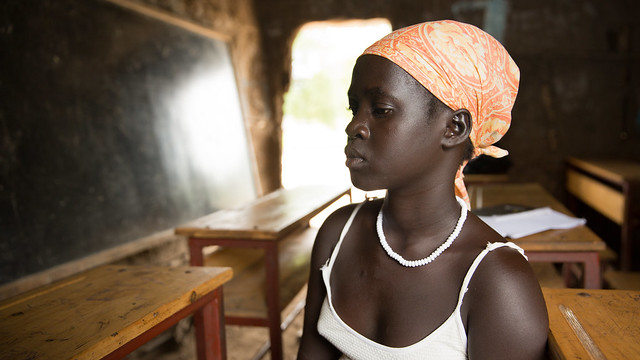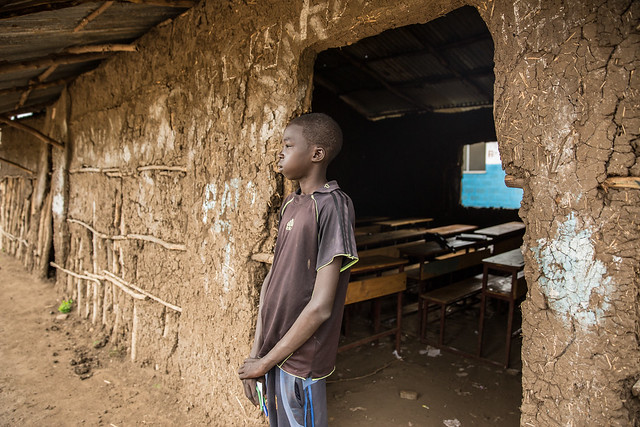By Wossen Mulatu

“We need peace. If there is conflict, I cannot follow my education properly and there will be no development,” Nyamat. Her five year old younger sister and brother are abducted to a neighbouring South Sudan by the Murle tribe. © UNICEF Ethiopia/2016/Mersha
GAMBELLA, Ethiopia, 25 May 2016 – On April 15, hundreds of heavily armed men stormed through Nyamat Oactot’s village of Pagak in Ethiopia’s Gambella Region, stealing cattle, shooting people and kidnapping children.
The 16-year-old girl’s younger brother and sister were taken by raiders believed to be from the Murle tribe from neighbouring South Sudan, and have yet to be recovered. In the aftermath, parents across this part of Gambella have kept their children out of school in fear of further attacks.
“We need peace, if there is conflict, I cannot follow my education properly and there will be no development,” Nyamat said.
Ruey Tut Rue,15, lost his mother and brother and wishes he could bury himself in his studies to keep from thinking about them, but instead he has been frustrated by three weeks of school closure.
“I feel upset and my mind is not focused,” he said. “Reading complicated subjects like biology and chemistry is now helping me to divert my attention from thinking about my mother.”
The attacks have also destroyed school materials making reopening the schools even harder, said Paul Puok Tang, the head of the Lare Woreda (district) education office.
“The dropout rates have also increased,” he said. “Through UNICEF and government support, we are now trying to rehabilitate the schools and purchase school supplies for the communities that are affected.”
Gambella Region is one of the states in Ethiopia that is part of UNICEF’s Peacebuilding, Education and Advocacy Programme (PBEA), along with Afar, Benishangul-Gumuz and Somali regions.
These four regions suffer from neglect and frequent exposure to man-made and natural disasters such as drought and floods and because of their close proximity to conflict zones. Since 2014, annual disaster and risk response plans have been put in place to help them cope with major disasters.

Ruey Tut Rue, 15, and 7th grade student did not go to school for three weeks due to the recent abduction of large numbers of children in the Gambella Region of Ethiopia by Murle pastoralists from South Sudan ©UNICEF Ethiopia/2016/Mersha
UNICEF has enlisted the support of the African Centre for Disaster Risk Management to come up with disaster and risk response plans at 31 schools in Gambella and 13 schools in Benishangul-Gumuz to develop the capacity of schools and communities to respond to disasters.
In the case of an attack like the recent cattle raid, villagers are taught to know when the raids come and what to do with their children during that period, said Omod Abela, Process Owner of Planning and Resource Mobilisation in Gog Woreda, Punido Kebele (sub-district),.
“We know that it is a seasonal occurrence – they come between March and May following their cattle and we teach communities not to send their children to herd cattle during this season, but to keep them at home and study,” he said. “Also, we teach parents that children should not play in isolation but surrounded by adult members of the community.”
PBEA seeks to strengthen resilience, social cohesion and peacebuilding in the four regions through strengthened policies and practices in education.
In Gambella, over 1,200 educational officials have been trained to promote peace and social cohesion within the region through disaster planning, peacebuilding, combatting school-related gender-based violence and promote child-friendly schooling.
“Parents and children need to understand the value of education,” explained Tok Bel from Lare Woreda Education Office. “Out of school children are more prone to be involved in conflict situations. Even during the recent Murle attack, most lives that were saved were those of children who were attending classes when the incident happened. Education saves lives.”
Ethiopia started the implementation of the PBEA in October 2012 with the Federal Ministry of Education and the four regional education bureaus.
The programme, which ends in 2016, is integrated across UNICEF’s US$60 million Learning and Development Programme and is a global initiative funded by the Government of the Netherlands.
“Where there is peace, education will go well. Without knowledge and education, there are no doctors and without doctors, many people will die,” said Gatiat Wal Rik, 15, a student from Bulimkum Primary School.